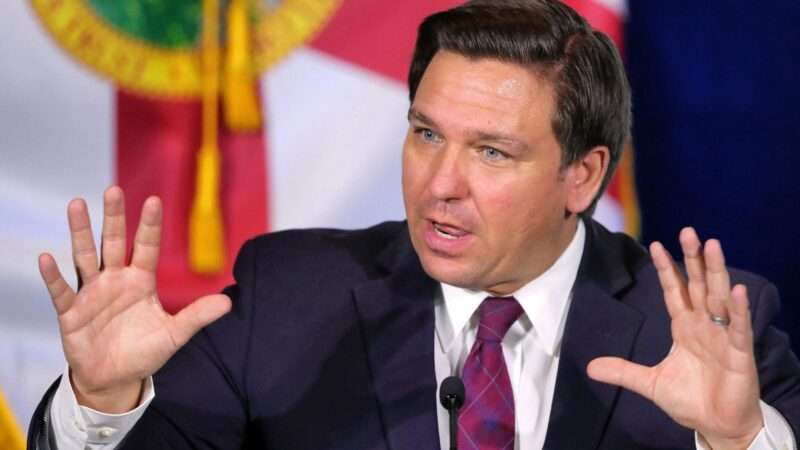
The House of Representatives today approved a bill that would repeal the federal ban on marijuana by a vote of 220 to 204. That tally includes 217 Democrats but just three Republicans, two fewer than voted for an earlier version of the bill, the Marijuana Opportunity Reinvestment and Expungement (MORE) Act, when the House approved it in December 2020.
The nearly nonexistent Republican support for the MORE Act in the House does not bode well for its chances in the Senate, where 10 Republican votes would be needed to overcome a filibuster even if Democrats unanimously supported the bill. The same goes for the legalization bill that Senate Majority Leader Chuck Schumer (D–N.Y.) plans to introduce next month.
The MORE Act and the draft bill that Schumer unveiled last July both include unnecessarily contentious provisions that are apt to alienate Republicans who might otherwise be inclined to resolve the conflict between federal prohibition and state laws that allow medical or recreational use of marijuana. Those provisions, which include new taxes, regulations, and spending programs, suggest that Democrats want credit for trying to legalize marijuana but are not really interested in building the bipartisan coalition that would be necessary to accomplish that goal.
When the House approved the MORE Act in 2020, it was the first time that either chamber of Congress had voted in favor of marijuana legalization. But as expected, the bill went nowhere in the Senate, which at the time was controlled by Republicans. The Senate is now evenly split between the two parties, with Democratic control hinging on Vice President Kamala Harris’ tie-breaking vote. Any serious attempt to repeal federal prohibition therefore depends on attracting Republican support, which Democrats have made little effort to do.
There is much to like in the MORE Act, which House Judiciary Committee Chairman Jerrold Nadler (D–N.Y.) reintroduced last May. The bill would remove marijuana from the list of federally prohibited drugs; eliminate federal criminal penalties for manufacturing, distribution, and possession; and require automatic expungement of federal marijuana convictions. It also would remove various marijuana-related restrictions on immigrants, government contractors, federal employees, and recipients of public benefits.
If Nadler had stopped there, the bill probably would have attracted more than three Republican votes. But the MORE Act also would impose a 5 percent federal excise tax on cannabis products, rising to 8 percent after four years, in addition to frequently hefty state and local taxes. The bill requires marijuana suppliers to pay an annual “occupational tax,” obtain federal permits, report information to the Treasury Department, and comply with packaging, labeling, and storage regulations. The tax and regulatory provisions, including civil and criminal penalties for violating them, account for half of the 92-page bill.
The MORE Act would use the marijuana tax revenue for various purposes, including drug treatment, “services for individuals adversely impacted by the War on Drugs,” loans for marijuana businesses owned by “socially and economically disadvantaged individuals,” and grants aimed at reducing “barriers to cannabis licensing and [to] employment for individuals adversely impacted by the War on Drugs.” Those “social equity” provisions gave pause even to Rep. Matt Gaetz (R–Fla.), the lone Republican cosponsor of the bill.
Schumer’s draft bill, the Cannabis Administration and Opportunity Act, doubles down on that overly prescriptive and burdensome approach. It would impose a federal excise tax on marijuana starting at 10 percent and rising to 25 percent by the fifth year. State-licensed marijuana businesses, which already are regulated by state and local governments, would also be supervised by the Food and Drug Administration (FDA), the Treasury Department’s Alcohol and Tobacco Tax and Trade Bureau (TTB), and the Justice Department’s Bureau of Alcohol, Tobacco, Firearms, and Explosives (ATF). The bill envisions detailed rules dealing with production, storage, transportation, packaging, labeling, advertising, and sales.
Like the MORE Act, the Cannabis Administration and Opportunity Act would use revenue from the federal marijuana tax to create new spending programs. The Community Reinvestment Grant Program would “fund nonprofits that provide services to individuals adversely impacted by the War on Drugs, such as job training, reentry services, and legal aid, among other services.” The Cannabis Opportunity Program would “provide funding to eligible states and localities to make loans to assist small businesses in the cannabis industry owned by socially and economically disadvantaged individuals.” The Equitable Licensing Grant Program would “provide funding to eligible states and localities to implement cannabis licensing programs that minimize barriers for individuals adversely affected by the War on Drugs.”
One of the 202 Republicans who voted against the MORE Act today was Rep. Dave Joyce (R‒Ohio), a co-chair of the Congressional Cannabis Caucus. While Joyce remains committed to repealing the federal ban, he is not keen on the “social equity” stuff and thinks the MORE Act does not create a “responsible regulatory framework.” He has introduced a competing legalization bill, the Common Sense Cannabis Reform Act, that aims to treat marijuana like alcohol.
Joyce’s bill is just 14 pages long, and it does not include a federal marijuana tax. He calls it “the only Republican-led comprehensive cannabis reform bill that does not include any MORE Act provisions.”
That seems like a veiled reference to the 133-page legalization bill sponsored by Rep. Nancy Mace (R‒S.C.), the States Reform Act, which is closer to the MORE Act but aims to attract more GOP support. Mace, who also voted against the MORE Act today, would impose a 3 percent excise tax, which would remain at that level for at least 10 years. According to Mace’s summary of the bill, the 10-year moratorium on raising the excise tax is meant to “ensure competitive footing in the market.” In other words, a relatively low tax rate will help legal marijuana businesses compete with black-market dealers, who do not pay taxes.
The States Reform Act would create a Law Enforcement Retraining and Successful Second Chances Fund, which would funnel marijuana tax money to three existing programs: the Crisis Stabilization and Community Reentry Grant Program, the Edward Byrne Memorial Justice Assistance Grant Program, and the Community-Oriented Policing Services Program. Some of the money also would be assigned to “veterans’ mental health,” “state opioid epidemic responses,” “preventing underage use of cannabis,” and the SBA “for supporting newly licensed small [marijuana] businesses through its various programs.”
Mace’s bill, like Schumer’s and the MORE Act, envisions a regulatory role for federal agencies, but it is relatively restrained and gives states more leeway. For example, it says the FDA “shall have the same authorities with respect to cannabis products that it has with respect to alcohol,” such as label regulation for certain beverages, “and no more.”
According to the summary, that provision “ensures that cannabis products in interstate commerce will be treated like alcohol and that the regulatory issues harming the industrial hemp-derived CBD industry will not be repeated in the cannabis space.” The bill also “grandfathers ‘designated state medical cannabis products,'” including “those produced consistent with state law,” to ensure “continued access” for patients. The FDA “may still prescribe serving sizes, certify designated state medical cannabis products as a ministerial duty, and authorize new drugs or approved new uses of drug applications to create new pharmaceutical grade products, but may not prohibit the use of cannabis or its derivates in non-drug applications, such as in designated state medical cannabis products, dietary supplements, foods, beverages, non-drug topical solutions, or cosmetics.”
Continuing the analogy to alcohol, the TTB “will be the primary regulator of cannabis products in interstate commerce,” while the ATF “will serve as the primary law enforcement agency supporting the TTB’s work, exactly as it does in the alcohol space.” The Department of Agriculture would regulate cannabis crops in the same way it regulates raw materials for alcoholic beverages, such as grain and hops. The bill “applies to cannabis the same recordkeeping, liability, reporting, packaging, and labeling requirement[s]” that apply to the alcohol industry under the Internal Revenue Code. The bill would prohibit cannabis advertising that is false, misleading, or aimed at minors.
Joyce’s brief and straightforward bill seems like the best approach to me. While Mace’s complicated concessions are aimed at attracting Democratic support, that does not seem to have worked so far. Her bill has just four cosponsors, all Republicans. Joyce’s bill has eight cosponsors, including Mace and four Democrats. Neither tally is very impressive. But even at this stage, both bills have more GOP support than Democrats managed to attract for the MORE Act.
The post The House Just Approved Marijuana Legalization Again, but GOP Support Remains Nearly Nonexistent appeared first on Reason.com.
from Latest https://ift.tt/COhJAZu
via IFTTT




